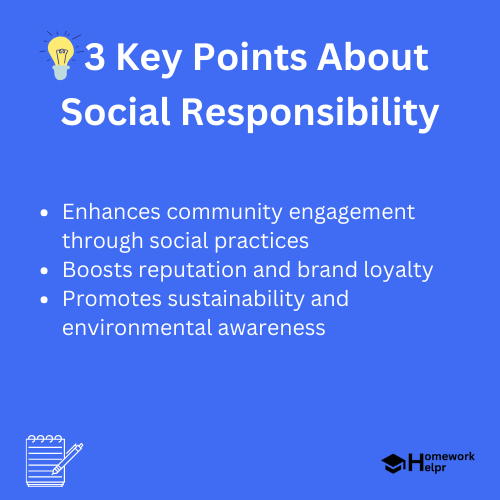📝 Summary
Social responsibility is an ethical framework encouraging individuals and organizations to act for the benefit of society. It emphasizes accountability and the impact of actions on both the environment and communities. The importance of social responsibility lies in enhancing community engagement, boosting reputation, and promoting sustainability. This multifaceted concept includes Corporate Social Responsibility (CSR), environmental responsibility, and philanthropic efforts. Individuals can practice social responsibility through volunteering, ethical consumption, and education. Embracing social responsibility is vital for a sustainable future.responsibility.
Understanding Social Responsibility
Social responsibility is the ethical framework that suggests individuals and organizations have an obligation to act for the benefit of society at large. It encourages people and companies to be accountable for their actions and to consider the impact of their activities on the environment and society. In an increasingly interconnected world, understanding social responsibility is crucial for fostering a sustainable future.
Definition
Ethical framework: A system of principles that provides guidelines for making choices and understanding duties towards others.
The Importance of Social Responsibility
Social responsibility is vital for several reasons that contribute to the overall well-being of society. Below are some of the key reasons why it is essential:
- Enhances Community Engagement: When businesses and individuals actively participate in their communities, they foster a spirit of connection and mutual support.
- Boosts Reputation: Organizations that embrace social responsibility often gain a positive reputation, attracting customers who prefer ethically responsible brands.
- Promotes Sustainability: Actions taken in the name of social responsibility often lead to more sustainable practices, which help in protecting the environment.
Examples
For instance, companies like Patagonia are known for their commitment to environmental sustainability, encouraging customers to buy less and recycle more.
Types of Social Responsibility
Social responsibility can be categorized into various types, each playing a unique role in shaping societies and environments:
- Corporate Social Responsibility (CSR): Involves companies integrating social and environmental concerns in their business operations.
- Environmental Responsibility: Focuses on minimizing industrial pollution and reducing carbon footprints.
- Philanthropic Responsibility: Involves charitable contributions and support for community programs.
Definition
Corporate Social Responsibility (CSR): A business model that helps a company be socially accountable to itself, its stakeholders, and the public.
Examples of Social Responsibility in Action
Many organizations and individuals endorse social responsibility, resulting in meaningful initiatives worldwide:
- Local Nonprofits: Many nonprofits strive to address community needs, such as food banks and shelters.
- School Programs: Educational institutions often have programs teaching students the importance of volunteering and community service.
- Eco-Friendly Brands: Companies like The Body Shop promote ethical consumerism by sourcing ingredients sustainably.
❓Did You Know?
Did you know that businesses practicing social responsibility can increase their profits by as much as 20%? It’s true! Many customers prefer to support brands that give back to society.
How Individuals Can Practice Social Responsibility
Individuals can also contribute to social responsibility in various ways:
- Volunteering: Giving your time to local organizations is a great way to support your community.
- Ethical Consumption: Choosing to buy products from companies that have sustainable practices can drive change in the market.
- Educating Others: Sharing knowledge about social issues can inspire others to take action.
Definition
Ethical consumption: The purchase of goods and services that are produced responsibly and sustainably, reflecting the consumer’s values.
The Role of Education in Social Responsibility
Education plays a pivotal role in raising awareness about social responsibility. Schools can incorporate programs and activities that foster a sense of duty and commitment among students. Educational initiatives can include:
- Workshops: Hosting workshops on sustainable practices and community engagement.
- Projects: Assigning students community service projects to encourage empathy and active participation.
- Collaborations: Partnering with local organizations for educational trips that focus on social issues.
Conclusion
In summary, social responsibility is a multifaceted concept that encompasses ethical, environmental, and community-centered practices. By understanding and embracing social responsibility, both individuals and organizations can make a significant impact on society. It cultivates a culture of accountability and empathy, which is essential for a thriving and harmonious community.
Incorporating social responsibility into our daily lives and business practices is not only beneficial for the present but also paves the way for a sustainable future. Let‚’ act with purpose and commitment towards building a better world for everyone!

Related Questions on Social Responsibility
What is social responsibility?
Answer: It is an ethical framework for societal benefit.
Why is social responsibility important?
Answer: It enhances community engagement and reputation.
How can companies show social responsibility?
Answer: Through CSR and sustainable practices.
What can individuals do for social responsibility?
Answer: Volunteer, consume ethically, and educate others.
